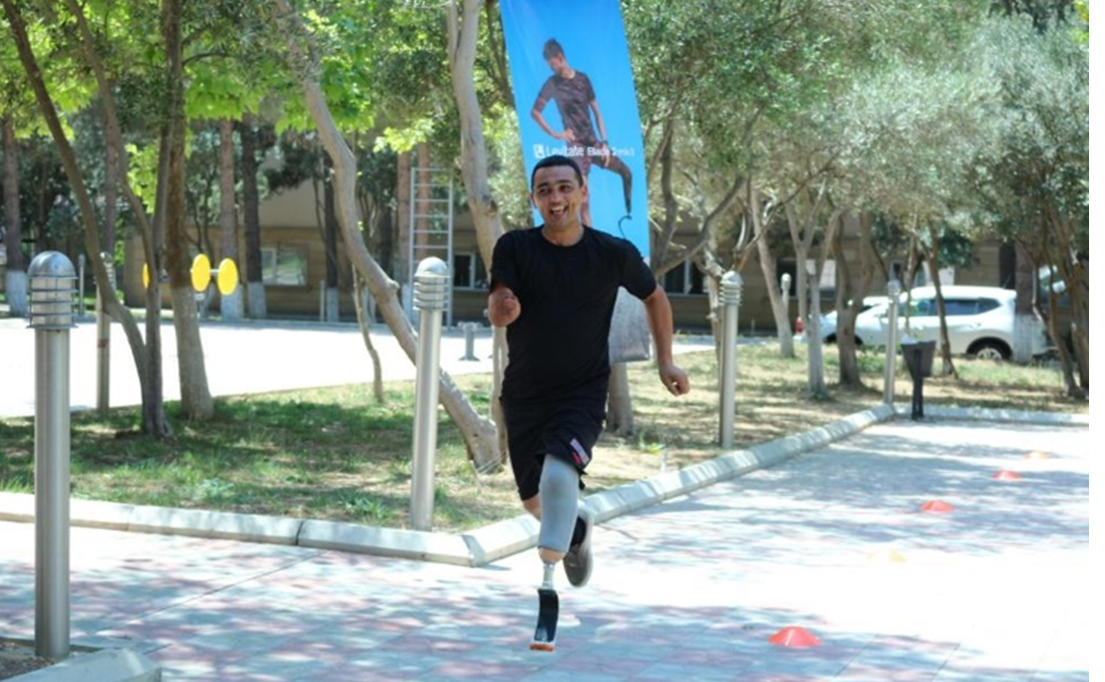
A chance for a better life: restoring justice for people with disabilities
The official records report over half a million people with disabilities living in Azerbaijan. However, the real figures are much higher. Often people, eligible for a disability pension, face an unjust rejection or termination of their disability status. Finding a job is also a major challenge. The EU-funded project “Protecting human rights of vulnerable groups in Azerbaijan” implemented by the OHCHR provided a subgrant support to the “Law and Development” Public Association that stepped in to bring a change. Within only eleven months it has provided free legal consultation and legal aid to over 500 people with vulnerable background, giving them a chance for a better life.
Learning to live anew
Intiqam Akbarov is 32, and he is a war veteran. He started his military career in 2017 as a combat engineer with a tough mission of detecting and clearing mine areas. With the outbreak of the Second Karabakh War in September 2020, Intiqam was sent to the front line. His group was clearing the territories from mines and explosives to ensure a safe passage for the troops. On 16 November he was caught in two explosions and was seriously injured. He lost his left leg and his right arm; he had a brain injury, his ear membranes were ruptured and his right eye damaged. After a long time in military hospitals, Intiqam returned home. “When the war ended, I was in such a state that the last thing I could think of was getting money for my disability,” – recalls Intiqam. “I was not even thinking about disability, I did not think it was possible or necessary. It was Hafiz Hasanov, a lawyer from the “Law and Development” who explained to me and other veterans about the law on disability and about our right to social benefits”.
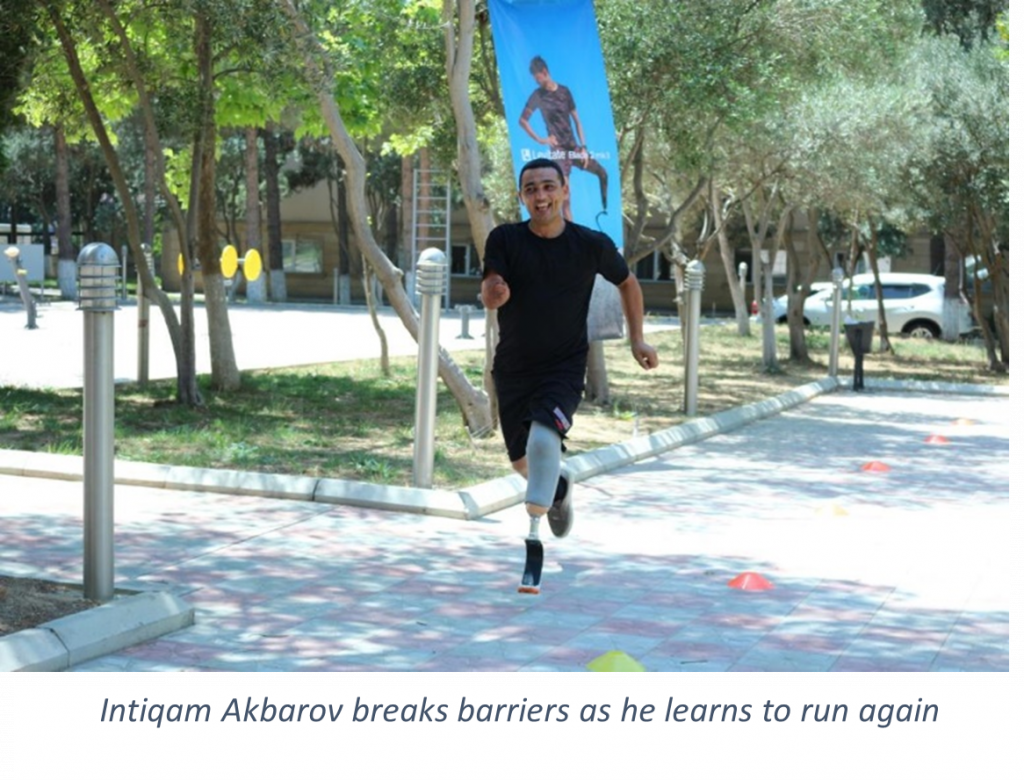
With 80% of mobility loss, Intiqam was entitled to claim for the first degree of disability, however, the governmental offices granted to him only the second one. The lawyer requested for an impartial assessment of Intiqam‘s medical documentation, strictly in line with the acting law. Luckily, the case was solved without taking to the court. In a second step, the LDPA helped the war veteran with a social housing and a car which he had the right to. “Hafiz explained in every detail which documents were needed, according to which law and what specific articles of laws we were entitled to certain benefits, guided us on the relevant state agencies to address,” – specifies Intiqam. – “He accompanied me and other veterans from place to place, carrying our wheelchairs; he spoke for us when he saw that we were not able to handle legal discussions”. The Association assisted many veterans, like Intiqam, in the recognition of their disability status, improving their financial and social conditions and providing the required medical treatment. “Thanks to the lawyer’s help, I managed to return to a normal life,” – concludes Intiqam. – “I was able to continue my treatment, I received quality prostheses for my arm and my leg. I have a pension and can support my family. And I’m not going to watch my life slipping away from me. I will overcome any obstacle”.
Losing a job but never losing heart
Samira Amirova, 55, is almost blind but she has strong sensitive hands. Samira is a certified masseuse, a graduate of a governmental programme supporting visually impaired adults in developing a career in massage therapy. Until 2019 she worked in the boarding house for people with disabilities at the State Medical and Social Expertise and Rehabilitation Agency in Shagan, a settlement near Baku, Azerbaijan. “When the pandemic started in 2020, my whole life and career turned upside down” – sadly notes Samira. “The Agency terminated my contract without prior notice, leaving me no means to survive. I loved my job as a massage therapist. Being a person who has lived the entire life with a disability, I believe to understand the disabled people very well. When I lost my job, l suddenly felt very helpless and miserable. Work is everything to me”, – shares the woman.
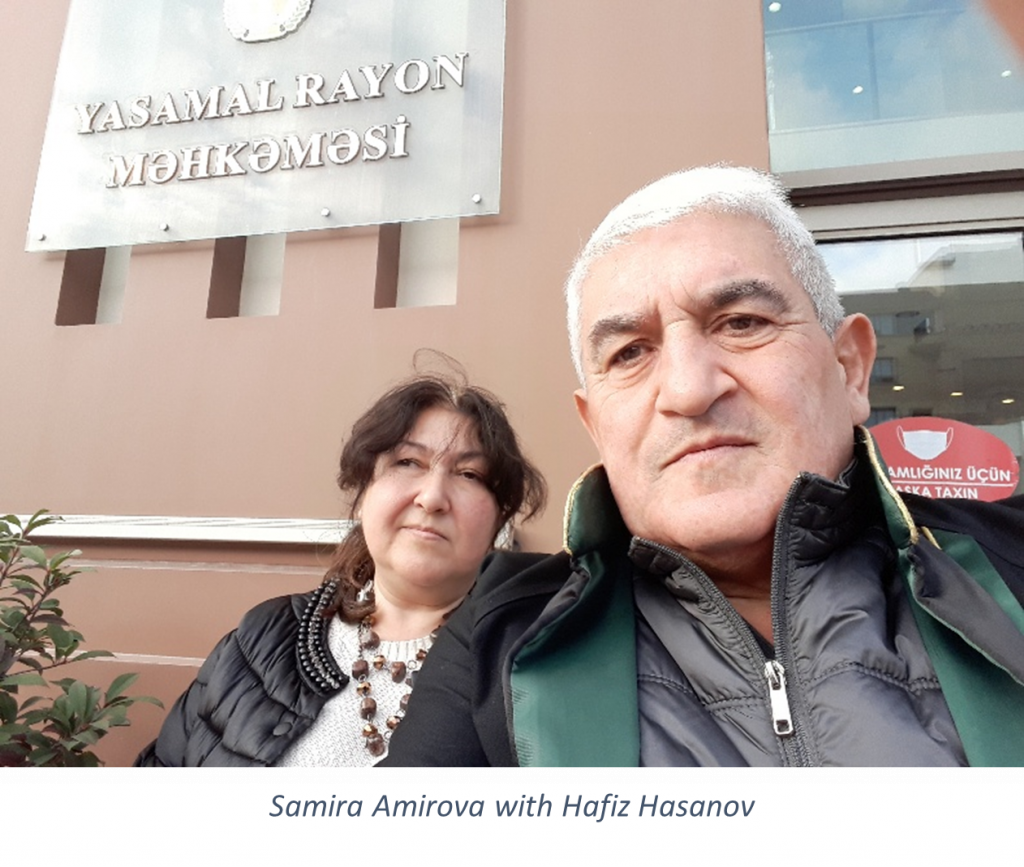
The lawyers she consulted at that time, considered her case lost as too much time had passed since the dismissal. Despite all, Samira didn’t lose heart. She has been a warrior all her life. She didn’t give up when her husband had left her with two small children and had evaded to pay child support. Back then, she had gone through a painful legal fight for her children’s right to alimony, and she won! This time, more than 20 years later, she decided to keep fighting, too. Via the Mediation Centre (a mandatory, pre-court dispute resolution mechanism) she learned about the “Law and Development” Public Association (LDPA) and its lawyer Hafiz Hasanov. He proved that Samira’s dismissal was illegal, and in 2022 won her case in two courts: in the local court and the Court of Appeal. Samira recalls: “When the Court of Appeal Judge saw my former employer appeal to dismiss the decision of the local court, he said: “Shame on you! How could you deprive a person with disability of her only job?” After a year and a half of a legal battle, the justice was restored – the Agency offered Samira a new contract. This time, as a social agent at the Children’s Rehabilitation Centre, a clinic for children with challenges in physical or mental development. However, the woman hopes to get back to the massage therapy: a position in a new rehabilitation centre has been already offered to her upon its opening.
A helping hand for those who need it most
Samira and Intiqam are just two out of 548 people who have received free legal support from the “Law and Development” Public Association (LDPA) in the frame of the project “Support to the legal protection of persons with disabilities” funded by the European Union through the United Nations Office of the High Commissioner for Human Rights (OHCHR). The project is part of the larger action titled “Protecting human rights of vulnerable groups in Azerbaijan” implemented by the OHCHR in Baku, with 95% of financial support from the EU and 5% of the OHCHR’s own contributions. Since the LDPA’s foundation in 2005, the Association has implemented over 50 projects related to legal awareness, legal aid and consultations, support to civil society and civic activism, making a valuable contribution to the democratisation process.
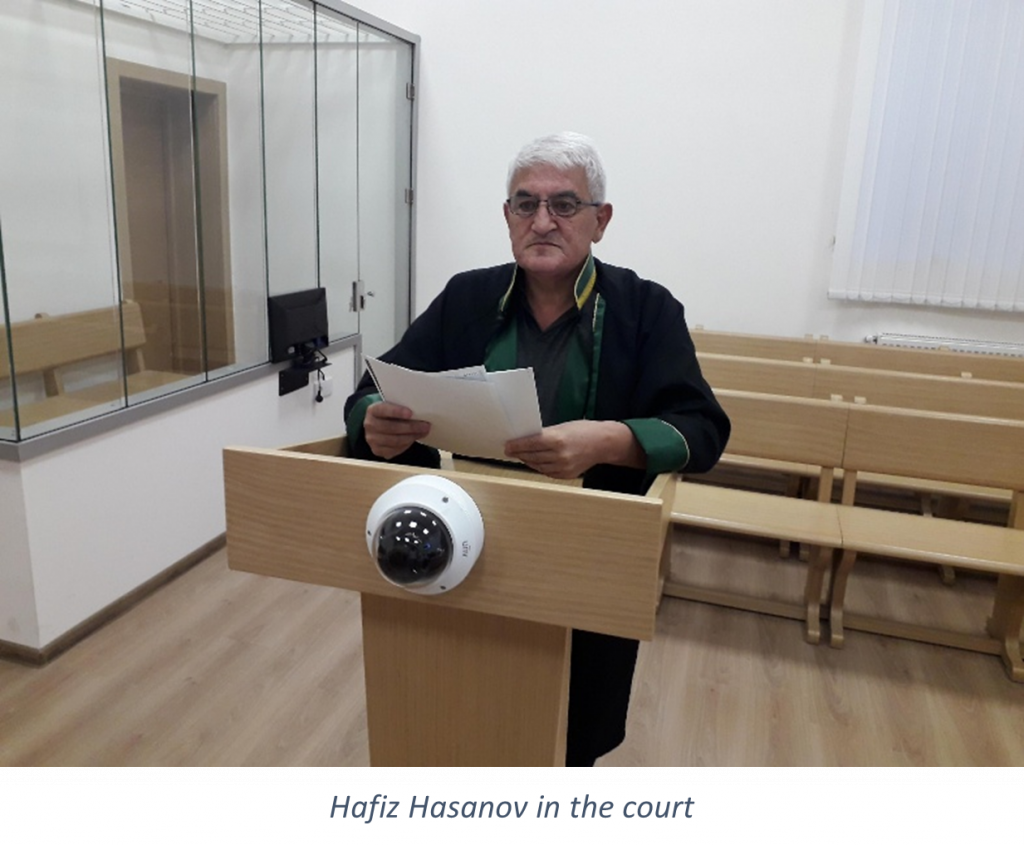
“Since 2/3 of our legal practice unfolds in the field of legal aid, we have accumulated considerable data, – says Hafiz Hasanov, a lawyer and a founding member of the Association. – “Our findings over these years show that people from vulnerable backgrounds, especially persons with health impairments, have the strongest demand for legal aid”. In a particularly vulnerable situation are people with disabilities across the rural areas of Azerbaijan. According to the lawyer, they have little knowledge about their rights and protection mechanisms, have reduced mobility to commute to the court or government offices and often simply cannot afford high fees for legal services (the initial attorney fees are 1.5 times higher than the current minimum wage in the country). The official statistics estimate around 500,000 people with disabilities living in Azerbaijan (as of June 2023). In practice, the figure is considerably higher. “There are numerous cases of revocation of the disability status. Our analysis and observation also show that too often people eligible for a disability pension were unfairly, unjustifiably and illegally rejected or terminated their disability benefits, – explains Mr. Hasanov. – “The project gave us the opportunity to address exactly this problem”.
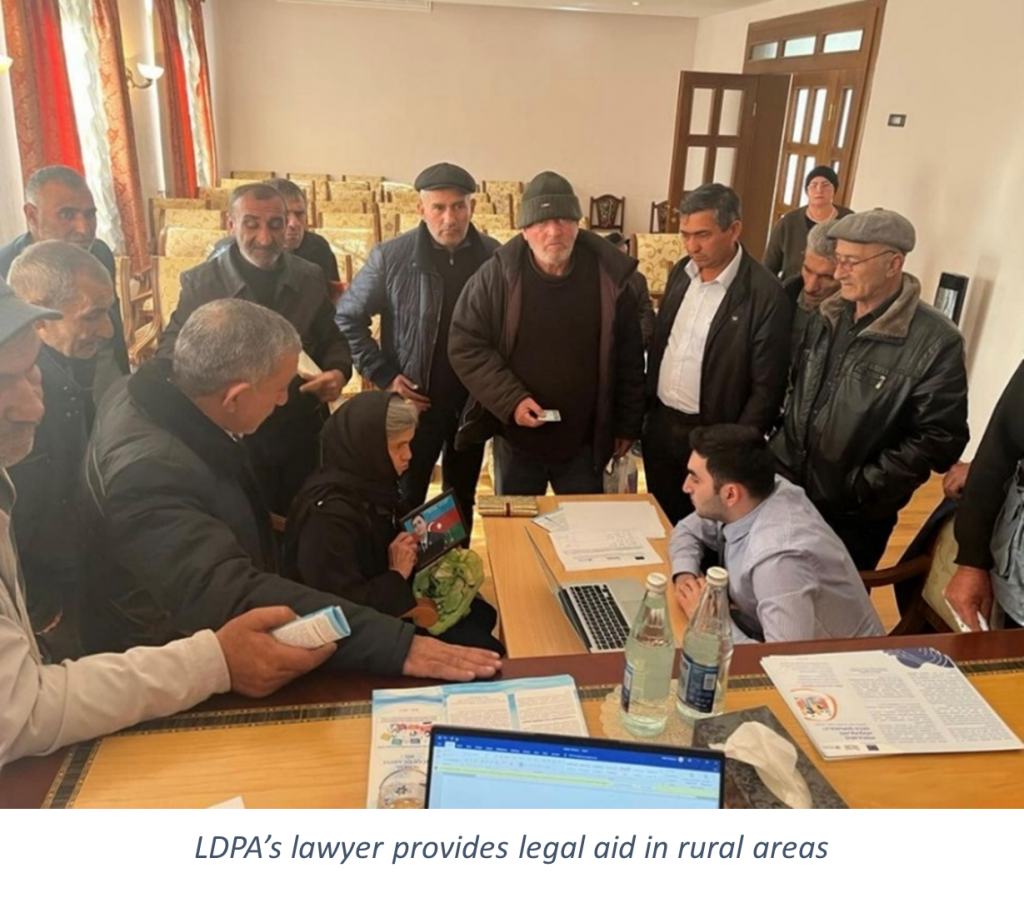
The project suggested a three-fold approach to the problem. In the first place, the LDPA opened a project office in Baku where the Association lawyers provided free legal aid and assistance to people with disabilities. “We identified four regions as the target areas – Barda, Aghjabadi, Lankaran and Quba, – says Mr Hasanov and continues, – “Barda and Aghjabadi were the closest to the line of contact during the Nagorno-Karabakh War. We chose them specifically because we targeted people with disabilities affected by the war. The other two regions – up north and down south – were selected to bring a broader picture on disability”.
The lawyers went on field missions to the four rural regions to hold legal aid sessions and on-the-spot consultations. Some cases were transferred to the capital to handle. The project created a Facebook page “Life with no impediment” to offer online legal aid and legal consultations, especially to the persons with reduced mobility who couldn’t travel to reach the lawyer. The Facebook page contains updates on relevant laws and legal-normative acts supplied with commentary and in-depth explanations.
With the aim of raising public awareness on legal provisions for people with disabilities, the Association published a booklet “Your rights”. Written in plain language, it guides through the essential steps in protecting their rights during administrative and court proceedings. “In the regions, there are NGOs that work with vulnerable groups and they need more guidance and support in the recent policies on the disability benefits. So, we felt that there was a strong need for these booklets among rural NGOs, and we distributed our publication and guided them when they needed our legal advice.” – remarks the lawyer. Finally, the project team developed a proposal package with recommendations to government agencies and ministries on the improvement of the current national legislation. These proposals aim to align it with international good practices, in line with Azerbaijan’s commitments to implement the provisions of the UN Convention on the Rights of Persons with Disabilities. The recommendations are built on the problems identified and collected during the project’s legal practice which mainly touch the revision of procedures for granting a disability status, the employment rights and job opportunities for the disabled, social protection and welfare benefits as well as legal protection of the rights of people with disabilities. Even after the project end, the Association keeps working on advocating for law reforms, while also providing online and offline legal consultations.
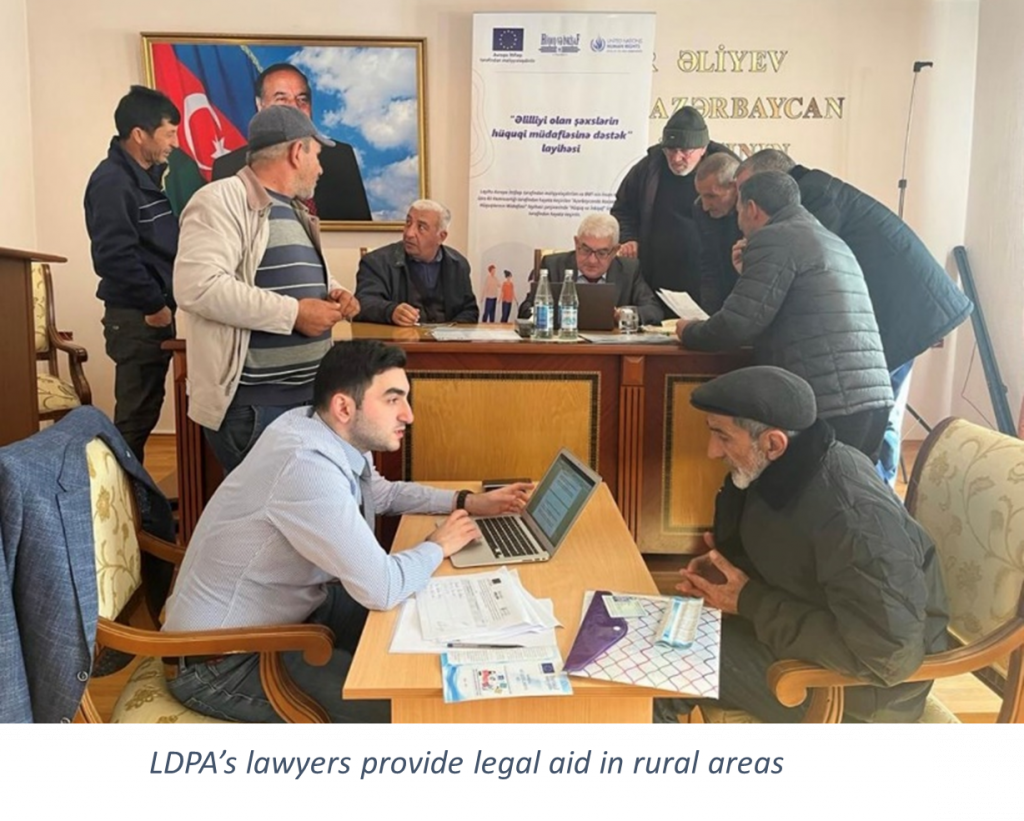
“It was a great experience to be able to follow individual cases from the beginning to the end in one project”, – shares Mr Hasanov, concluding, – “The project gave us the opportunity to strengthen cooperation with regional CSOs and build the ground for institutionalising the practice of pro bono legal aid at all levels. But the most rewarding thing was the emotional satisfaction we saw in the eyes of people whose violated rights we were able to restore using the only tool we had – the power of law”.